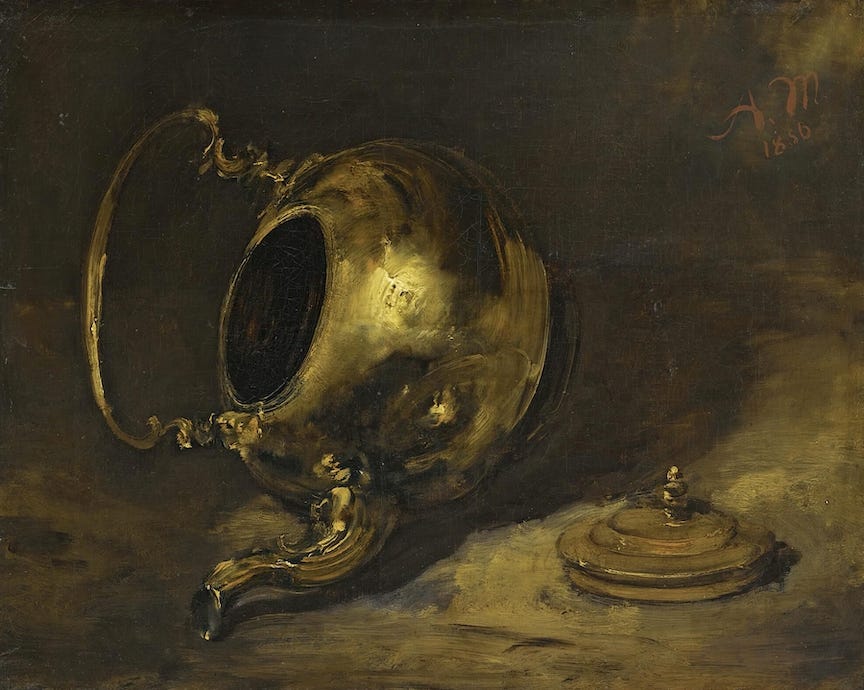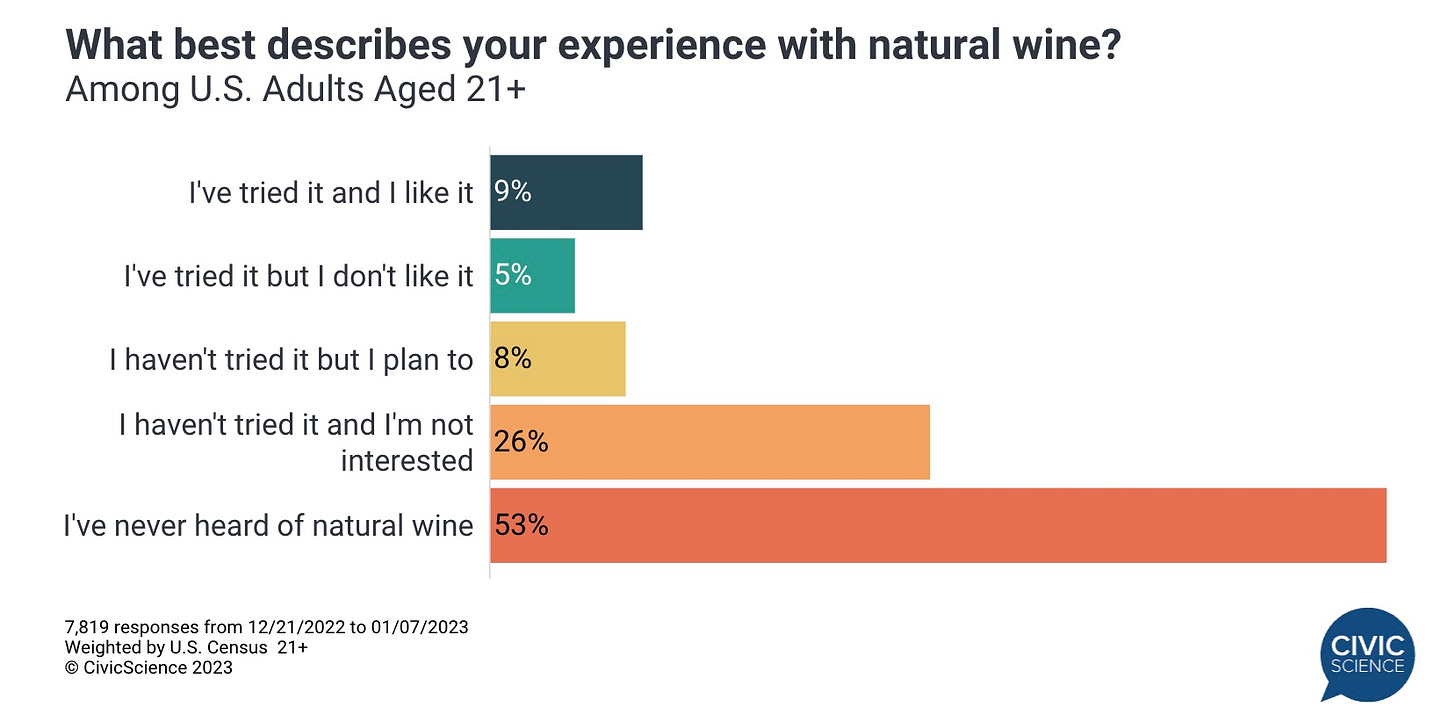Natural Wine: A Tempest in a Really Tiny Teapot
Why Natural Wine Seems Much Bigger than It Really Is
It’s becoming increasingly clear that the attention being paid to “Natural Wine” is far outsized compared to its real popularity. Most folks in the wine industry not entirely under the spell of the natural wine movement have recognized this fact for some time.
Now we have some surveys that confirm this suspicion.
One way to interpret the above findings published at CivicScience.com is that 91% of those surveyed on their familiarity with and feelings about Natural Wine either had never tried it or tried it and didn’t like it. This isn’t an indictment of Natural Wine. After all, if you asked the same 7,819 people “What Best Describes Your Experience With Gruner Veltliner”, you’d probably get a similar response.
However, we aren’t seeing constant stories about the importance or life changing nature of Gruner Veltliner.
Instead, we are seeing a regular parade of stories that glorify the niche, that make it seem like it’s taking over the industry and that do their best to debunk the undebunkable—such as the recent story that attempts to dismiss the common knowledge that Natural Wine isn’t better for your health.
For example, at TheTakeOut.com we saw a recent story entitled, “Natural Wine, Hangovers, and the Science of Post-Drinking Misery”. Presumably an investigation into the science behind natural wine and hangovers, the piece is written by Danny Palumbo. Palumbo is an LA-based comedian whose most recent pieces for The Takeout include “There’s a Better Pringle than Pringles”, “Making Your Own Doritos Flavor is Shockingly Easy”, and “Ketchup Chips Should Be Everywhere.”
Danny seems the right person to undertake this investigation given his most recent stories, but also due to his connection to wine:
“Wine has just never been something that I’ve cared too much about, so I was the first one to write off natural wine as a pretentious, overpriced, agro-chic fad. Moreover, the wine industry already skeeves me out due to its perceived exclusiveness—slimy, well-dressed DJs sniffing and swirling glasses at hip wine bungalows in Los Angeles are just not the type of people I like to hang out with.”
So, off Danny goes. After describing a get-together with his friend Karl, on whose porch he sat and shared “a few bottles of” natural wine we come to see his conundrum:
the next morning I woke up as if shot out of a cannon. No headache, no nausea, no discomfort. I slept like a baby. ‘There’s no hangover,’ I proudly exclaimed to friends afterward. But was that true? Was the wine’s ‘naturalness’ the reason I didn’t have the hangover, or was I just regurgitating the propaganda of the natural wine industry without any facts?
So, Danny investigates and reports that “There’s just no science to consistently support the claim that natural wine doesn’t cause hangovers” and “There is absolutely no proof that your natural wine hangover will be any less severe.”
Apparently unsatisfied with the results of his investigation, Danny wonders, “Could it simply be that consuming good food and drink makes you feel good?” And from here we get a quote from Natural Wine champion Isabelle Legeron:
“If you understand how proper food can provide a nourishment that goes beyond merely satisfying hunger and that the energy, commitment, and intentions of natural wine producers matter, then you’ll see just how special fine, natural wine is.”
It shouldn’t take the kind of quick mind that can undertake a dive deep into Pringles, Doritos, and Ketchup Chips to see that Ms. Legeron’s paeanic description of Natural Wine could just as easily and justifiably be a description of all other non-natural wines. But in the end, Danny dismisses the science and puts it back on the wine drinker to listen instead to their lived experience to answer the question does Natural Wine prevent hangovers: “Whether or not natural wine is proven to reduce your hangover, you just have to listen to your body as you drink it, because there’s no concrete evidence that it will.”
Danny doesn’t get to the heart of the Natural Wine movement and what motivates the excessive coverage of a wine category that clearly doesn’t have much of a following. But to be fair, that’s not his intent. There are Pringles, Doritos and Ketchup to be investigated.
But it does beg the question, what’s behind the excessive coverage given to Natural Wine?
It has always been my observation that the Natural Wine movement is not just a culinary or wine trend, but rather part of a social and cultural movement. The movement is not as much a response to the perceived homogenization of wine styles or “Parkerized” wines or industrial wines, as so many Natural Wine champions claim. No. This natural wine movement is much more. It exists as part of a response to a much smaller world where regionalism has been replaced by globalism. It is the slow food movement, the anti-globalization movement, the culture’s retreat from ordered sectarianism into a more disorderly paganism. It is a striking out against the West. In many cases, it is a desire by some to find meaning in their lives and make a difference in the world where the traditional sources of meaning (home, work, country, family, and God) have gone out of style. And, of course, declarations of fealty to Natural Wine and against “conventional” wine. with what surely must contain deadly chemicals, is seen as a sure sign of one’s virtue.
These combinations of factors, I think, explain the inordinate attention that has been paid to what is an extremely niche sector of the wine market. More importantly, the wine industry would do well to think about these things and how they have propelled Natural Wine to its unnaturally high status in the industry.
With the exception of a very tiny number of huge wineries, the majority of wineries are very small, family-owned, environmentally conscientious affairs. We are talking largely about small plot farmers who, while the world spins and becomes smaller and smaller, tend to focus all their attention on the weather patterns, the contours of the earth, the welfare of those who work for and with them, and generally are satisfied by putting something in a bottle that will bring pleasure to folks who buy their wine —which overwhelmingly is not “natural”.
The Natural Wine movement—again, small as it is—is an authentic response to a rapidly changing world is disorienting and where meaning is hard to nail down. The rest of the wine world might take this to heart.




